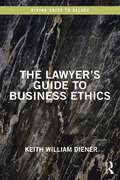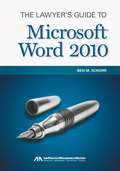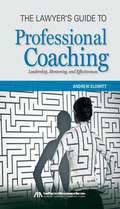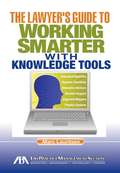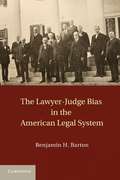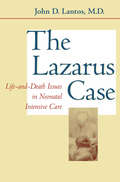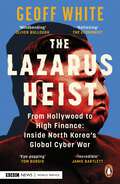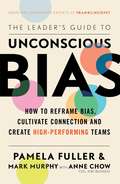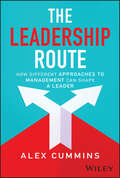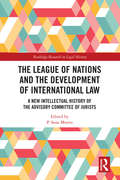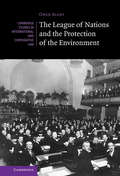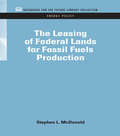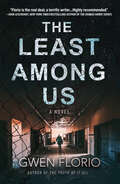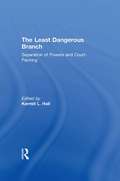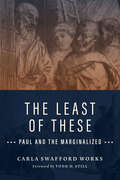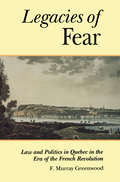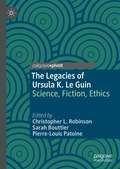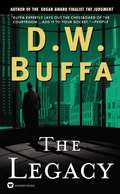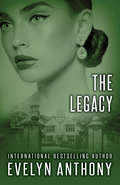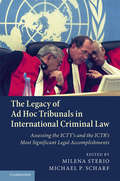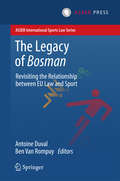- Table View
- List View
The Lawyer's Guide to Business Ethics (Giving Voice to Values)
by Keith William DienerLegal practice is both a profession and, increasingly, a business. Lawyers are routinely confronted with a complex set of ethical questions due to the adversarial nature of legal practice and justice, and at the same time handle relationships with different stakeholders within their own practice, including clients, partners, and managers. This presents a unique set of challenges that are not experienced in other professions. This book provides a framework to guide the practicing lawyer through these various levels of ethical complexity. Written in a highly accessible style, The Lawyer’s Guide to Business Ethics transforms business ethics theory for the practice of law, identifying the unique applications and ways in which lawyers can utilize the theory and principles to enhance their decision making and case management techniques. The book examines the social, ethical, personal, and economic forces influencing lawyers' work, explains the rules of professional conduct, and presents real-life ethical dilemmas to enhance learning and to assist in finding appropriate outcomes. This book will be an invaluable resource for legal practitioners, law students and business students, and anyone interested in maintaining ethical behavior in the practice of law.
The Lawyer's Guide to Microsoft® Outlook 2010
by Ben M. SchorrThe Lawyer's Guide to Microsoft® Outlook 2010 is the only guide written specifically for lawyers to help you be more productive, more efficient and more successful. More than just email, Outlook is also a powerful task, contact, and scheduling manager that will improve your practice.
The Lawyer's Guide to Microsoft® Word 2010
by Ben M. SchorrThis handy reference includes clear explanations, legal-specific descriptions, and time-saving tips for getting the most out of Microsoft Word®--and customizing it for the needs of today's legal professional. Focusing on the tools and features that are essential for lawyers in their everyday practice, The Lawyer's Guide to Microsoft® Word 2010 explains in detail the key components to help make you more effective, more efficient, and more successful.
The Lawyer's Guide to Professional Coaching: Leadership, Mentoring, and Effectiveness
by Andrew ElowittBecome more efficient and profitable in your law practice by employing a professional coach. The Lawyer's Guide to Professional Coaching will teach you to find, select, and work productively with the right coach for your needs--and transform your practice in the process. Learn how to get the most out of coaching, decide whether coaching is right for you and your firm, and use coaching skills when you collaborate with clients and colleagues.
The Lawyer's Guide to Working Smarter With Knowledge Tools
by Marc LauritsenLauritsen, a lawyer with experience in knowledge-system development who is also an educator and speaker on the uses of information technology in the legal profession, offers a guide for lawyers and other legal professionals in all settings to help them find and understand software tools that can be used to support their work. He addresses technologies like work product retrieval, document assembly, expert systems and artificial intelligence, online systems, decision support tools, and interactive checklists, as well as why and how to use them. He discusses their benefits and costs; technical, financial, and management issues; how to choose tools and develop systems; and financial benefits. He does not cover software like word processing or email, e-discovery, applications for the business side of law, or cutting-edge technology. Annotation ©2010 Book News, Inc. , Portland, OR (booknews. com)
The Lawyer's Lawyer
by James SheehanJack Tobin, the main character of THE MAYOR OF LEXINGTON AVENUE returns in this non-stop novel that combines enthralling plot twists with some of the best coutroom fiction being written today.Tobin, known as the lawyer's lawyer--the guy the best lawyer's say they'd want to represent them in a courtroom battle--undertakes the representation of a serial killer who he believes to be innocent. The Chief of Police is outraged, the citizens of Oakville where the murders occurred, erupt, and the State Attorney is out for blood as Jack challenges the criminal justice system once again.Sheehan masterfully weaves stories of love and friendship into one man's uncompromising search for truth within the four corners of a courtroom where it is often spoken about but seldom seen. Jack is in a fight for his life and the outcome is in doubt right up to the turn of the final page.A trial lawyer himself, James Sheehan is also a top-notch thriller writer. Once again he succeeds in translating the depth of his courtroom knowledge into an entertaining and truly fascinating read.
The Lawyer-Judge Bias in the American Legal System
by Benjamin H. BartonVirtually all American judges are former lawyers. This book argues that these lawyer-judges instinctively favor the legal profession in their decisions and that this bias has far-reaching and deleterious effects on American law. There are many reasons for this bias, some obvious and some subtle. Fundamentally, it occurs because – regardless of political affiliation, race, or gender – every American judge shares a single characteristic: a career as a lawyer. This shared background results in the lawyer-judge bias. The book begins with a theoretical explanation of why judges naturally favor the interests of the legal profession and follows with case law examples from diverse areas, including legal ethics, criminal procedure, constitutional law, torts, evidence, and the business of law. The book closes with a case study of the Enron fiasco, an argument that the lawyer-judge bias has contributed to the overweening complexity of American law, and suggests some possible solutions.
The Lazarus Case: Life-and-Death Issues in Neonatal Intensive Care (Medicine and Culture)
by John D. LantosA gripping exploration of the legal and ethical dilemmas in neonatal intensive care—a truly original work.Chosen as an Outstanding Academic Titles in 2003 by Choice MagazineIn this new, startlingly original book, John D. Lantos weaves a compelling story that captures the dilemmas of modern medical practice. The Lazarus Case: Life-and-Death Issues in Neonatal Intensive Care begins with a fictional malpractice case—an amalgam of typical cases in which Lantos appeared as an expert witness—and uses it as the framework for addressing the ethical issues surrounding neonatal intensive care. Lantos draws on his experience in neonatal medicine, pediatrics, and medical ethics to explore multiple ethical dilemmas through one poignant representative situation.In Lantos's model case, a doctor decides to stop resuscitation of a premature infant, a tiny "preemie" who seems past reasonable care. The baby survives with severe neurological defects and the parents sue the doctor, alleging that stopping treatment was negligent. From this case, Lantos considers our moral obligations to critically ill babies, the meaning of negligence, and the sorts of social structures that shape the moral consciences of doctors.Each chapter begins with Lantos deposing in the conference room of the plaintiffs' lawyers. The questions put to Lantos throughout the deposition spark an engrossing retelling of his personal experiences with premature babies, as well as his thoughtful discussions of ethics, morality, history, and medical statistics. Sprinkled throughout the book are references to fictional works by Camus, Dostoevsky, Shakespeare, Twain, and others. Lantos uses these literary examples to further illustrate the ambiguities, misunderstandings, responsibilities, and evasions that plague our decisions regarding life and death, medical care and medical education, and ultimately the cost and value of preserving the lives of the most vulnerable among us.
The Lazarus Heist: Based on the No 1 Hit podcast
by Geoff WhiteBASED ON THE NO 1 HIT PODCAST: THE LAZARUS HEIST They have been accused of causing mayhem in Hollywood with 2014's infamous Sony hack.They're allegedly behind WannaCry, a cyber-attack which brought the NHS to a dangerous standstill.And it has been claimed that they have stolen more than $ 1bn in an international crime spree.They are the Lazarus Group, a shadowy cabal of hackers accused of working on behalf of the North Korean state.From the streets of Dhaka to the casinos of Macau to the secretive capital of Pyongyang, this shocking story uncovers the secret world of the Lazarus Group, their victims and those who have tried - and so far, failed - to stop them.'Madly intriguing' Guardian'You'll never see North Korea the same way again' Oliver Bullough, Moneyland'One of the most incredible cyber-espionage stories I've ever heard' Jamie Bartlett, The Missing Crypto Queen'Pacy and eye-popping' Tom Burgis, Kleptopia
The Lazier Murder
by Robert J. SharpeIn December 1883, Peter Lazier was shot in the heart during a bungled robbery at a Prince Edward County farmhouse. Three local men, pleading innocence from start to finish, were arrested and charged with his murder. Two of them -- Joseph Thomset and David Lowder -- were sentenced to death by a jury of local citizens the following May. Nevertheless, appalled community members believed at least one of them to be innocent -- even pleading with prime minister John A. Macdonald to spare them from the gallows.The Lazier Murder explores a community's response to a crime, as well as the realization that it may have contributed to a miscarriage of justice. Robert J. Sharpe reconstructs and contextualizes the case using archival and contemporary newspaper accounts. The Lazier Murder provides an insightful look at the changing pattern of criminal justice in nineteenth-century Canada, and the enduring problem of wrongful convictions.
The Leader's Guide to Unconscious Bias: How To Reframe Bias, Cultivate Connection, And Create High-performing Teams
by Mark Murphy Pamela Fuller Anne ChowA timely, must-have guide to understanding and overcoming bias in the workplace, from the experts at FranklinCovey. Unconscious bias affects everyone. It can look like the disappointment of an HR professional when a candidate for a new position asks about maternity leave. It can look like preferring the application of a red brick university graduate over one from a state school. It can look like assuming a man is more entitled to speak in a meeting than his female junior colleague. Ideal for every manager who wants to understand and move past their own preconceived ideas, Unconscious Bias explains that bias is the result of mental shortcuts, our likes and dislikes, and is a natural part of the human condition. And what we assume about each other and how we interact with one another has vast effects on our organisational success - especially in the workplace. Teaching you how to overcome unconscious bias, this book provides more than thirty unique tools, such as a prep worksheet and a list of ways to reframe your unconscious thoughts. According to the experts at FranklinCovey, your workplace can achieve its highest performance rate once you start to overcome your biases and allow your employees to be whole people. By recognising bias, emphasising empathy and curiosity, and making true understanding a priority in the workplace, we can unlock the potential of every person we encounter.
The Leadership Route: How Different Approaches to Management Can Shape a Leader
by Alex CumminsA new and inspiring take on leadership from a recognized expert In The Leadership Route: How Different Approaches to Management Can Shape a Leader, Alex Cummins—one of Malaysia's top business trainers—delivers a practical and eye-opening guide to leadership that takes a close look at both “traditional” and “evolved” styles of leadership, including what sets them apart and the benefits that flow from adopting an evolved approach to leading others. From developing a new and resilient mindset to creating a workspace of psychological safety, the author walks you through how to design and implement a workplace environment that your followers truly want to work in. You'll also find: Strategies for directing others, delegating responsibility, and motivating your followers to reach their full potential Ways to have difficult conversations in a way that directly addresses points of conflict without being adversarial Techniques for role modelling the behaviour you hope to see in your employees Perfect for new, aspiring, and seasoned managers seeking to navigate contemporary workplaces and lead effectively in all sorts of environments, The Leadership Route is a must-read guide for working professionals at every level of the corporate hierarchy.
The League of Nations and the Development of International Law: A New Intellectual History of the Advisory Committee of Jurists (Routledge Research in Legal History)
by P. Sean MorrisThis volume examines the contributions to International Law of individual members of the Advisory Committee of Jurists in the League of Nations, and the broader national and discursive legal traditions of which they were representative. It adopts a biographical approach that complements existing legal narratives. Pre-1914 visions of a liberal international order influenced the post-1919 world based on the rule of law in civilised nations. This volume focuses on leading legal personalities of this era. It discusses the scholarly work of the ACJ wise men, their biographical notes, and narrates their contribution as legal scholars and founding fathers of the sources of international law that culminated in their drafting of the statute of the Permanent Court of International Justice, the forerunner of the International Court of Justice. The book examines visions of world law in a liberal international order through social theory and constructivism, historical examination of key developments that influenced their career and their scholarly writings and international law as a science. The book will be a valuable reference for those working in the areas of International Law, Legal History, Political History and International Relations.
The League of Nations and the Protection of the Environment (Cambridge Studies in International and Comparative Law)
by Omer AloniIn the history of how the law has dealt with environmental issues over the last century or so, the 1920s and 30s and the key role of the League of Nations in particular remain underexplored by scholars. By delving into the League's archives, Omer Aloni uncovers the story of how the interwar world expressed similar concerns to those of our own time in relation to nature, environmental challenges and human development, and reveals a missing link in understanding the roots of our ecological crisis. Charting the environmental regime of the League, he sheds new light on its role as a centre of surprising environmental dilemmas, initiatives, and solutions. Through a number of fascinating case studies, the hidden interests, perceptions, motivations, hopes, agendas and concerns of the League are revealed for the first time. Combining legal thought, historical archival research and environmental studies, a fascinating period in legal-environmental history is brought to life.
The Leasing of Federal Lands for Fossil Fuels Production (RFF Energy Policy Set)
by Stephen MacdonaldStephen McDonald offers a basic understanding of the goals and practices by which the federal government leases its fossil fuel resources and how these practices affect the economy. Originally published in 1979
The Least Among Us: A Novel
by Gwen FlorioSearing social commentary meets chilling suspense as public defender Julia Geary takes a case destined to rock her small town to the core, for fans of John Lescroart.Public defender Julia Geary&’s star is rising, and now she&’s got her first murder case defending local denizen Ray Belmar in the death of a homeless man. But Julia&’s professional and personal challenges are mounting. First, she&’s assigned an intern whose arrogance is insufferable. Then, her widowed mother-in-law, whose home Julia and her son Calvin share, announces her plans to re-marry, meaning they&’ll have to find a new place to live. And to top things off, Julia&’s boss removes her from the case, saying that she&’s lost perspective, replacing her with an attorney who advises Ray to plead guilty. Julia can&’t shake the suspicion that the murder, and the subsequent killing of a homeless woman, is linked to the death of a state legislator who had been crusading for political reform. With the help of Duck Creek&’s homeless community and her old friend, Sheriff&’s Deputy Wayne Peterson, she launches her investigation—but then the anonymous threats start pouring in. Just as Julia begins to uncover the ways the system is shockingly stacked against those on the fringes of society, she makes an even more damning discovery. Someone close to her is harboring a dark secret they are desperate to protect—even if that means silencing Julia once and for all.
The Least Dangerous Branch: The Supreme Court in American Society (The\supreme Court In American Society Ser. #Vol. 5)
by Kermit L. HallAvailable as a single volume or as part of the 10 volume set Supreme Court in American Society
The Least of These: Paul and the Marginalized
by Carla Swafford WorksJesus cared for the least, but did Paul?The apostle Paul has a reputation for being detached from the concerns of the poor and powerless. In this book, Carla Swafford Works demonstrates that Paul&’s message and ministry are in harmony with the teaching of Jesus. She brings to light an apostle who preaches and models good news to the &“least of these&”—the poor, the marginalized, the disadvantaged, and the vulnerable. The Least of These begins by highlighting the presence of the marginalized in Paul&’s ministry by looking at poverty in Paul&’s churches, the involvement of slaves and freedpersons in the community, and the role of women in the Pauline mission. Works then examines the significance of the marginalized in Pauline theology by investigating how the apostle employs metaphors of the &“least.&” Like Jesus, Paul cared deeply for people at the margins. Paul&’s ministry is consistent with that of Jesus. Both men cared for the poor. Paul served the least in his mission, modeling his apostolic ministry after the cross of Christ. Works shows that Paul, far from being an abstract thinker, was a practical theologian teaching a message and leading a life of compassion, kindness, and care.
The Legacies of Fear
by F. Murray GreenwoodMany people assume that a French-English cleavage has always existed and historians have been uncertain as to just how it unfolded. This book provides the answer. Greenwood re-creates a Quebec in which trust between French and English Canadians was an early casualty of the execution of Louis XVI and the descent of the French Revolution through terror into war. Fearing invasion, the English community, through the law officers of the crown, drafted draconian legislation and established an efficient counter-intelligence service. Lower Canada in these years was a hotbed of spies and counter-intelligence, highlighted by the trial for high treason of an American undercover agent for revolutionary France. Placing the legal history of Quebec in the foreground of these dangerous and dramatic events, Greenwood reveals this period as a turning point that altered not only French-English relations but Canada's legal and constitutional inheritance.While the focus is on legal and political history, the narrative also details intellectual, military, social, and economic developments. The author pursues many dynamic themes of the period including the riots among working people in the 1790s; the differences in judicial behaviour when security matters were at stake; the setting up of the first formal counter-intelligence service, and issues related to the suspension of habeas corpus.Murray Greenwood is one of Canada's finest legal historians. In this work his wide perspective, supported by extensive documentation, brings new evidence and insight to a formative and somewhat neglected period in Canada's history.
The Legacies of Ursula K. Le Guin: Science, Fiction, Ethics (Palgrave Studies in Science and Popular Culture)
by Christopher L. Robinson Sarah Bouttier Pierre-Louis PatoineThe Legacies of Ursula K. Le Guin explores how Le Guin’s fiction and essays have built a speculative ethical practice engaging indigenous knowledge and feminism, while crafting utopias in which human and other-than-human life forms enter into new relations. Her work also delineates new ways of making sense of the “science” of science fiction. The authors of this collection provide up-to-date discussions of well-known works as well as more experimental writings. Written in an accessible style, Legacies will appeal to any readers interested in literature, science fiction and fantasy, as well as specialists of science and technology studies, philosophy of science, ethics, gender studies, indigenous studies and posthumanism.
The Legacy
by Dudley W. BuffaLone wolf lawyer Joseph Antonelli takes the case of a black man accused of murdering a senator in San Francisco. Antonelli soon finds himself in a world ruled by backroom politics and naked ambition--and learns just how much one person will risk in order to leave behind a legacy.
The Legacy
by Evelyn AnthonyWhen Christina Nordohl meets wealthy English widower, Richard Farrington, in Stockholm, it changes her life. They fall in love, and she returns to England with him as his wife. On his death twelve years later, Richard bequeaths Christina and her young daughter a great house, land, money, and a priceless Hebrew manuscript. But Richard's legacy comes with a downside in the form of his turbulent, hate-filled son, Alan, who has been disinherited. At his father's funeral he announces that he will contest the will, and has discovered something that will tear Christina and her daughter's world apart. Among the team defending Christina is the cold and sinister Swede, Rolf Wallberg--what is his real motive for taking the case? Christina neither likes nor trusts him. But neither of them can resist the force that brings them together.
The Legacy of Ad Hoc Tribunals in International Criminal Law: Assessing the ICTY's and the ICTR's Most Significant Legal Accomplishments
by Milena Sterio Michael ScharfIn the post-Nuremberg era two of the most important developments in international criminal law are the International Criminal Tribunal for Yugoslavia (ICTY) and the International Criminal Tribunal for Rwanda (ICTR). Created through UN Security Council resolutions, with specific mandates to prosecute those responsible for serious violations of international humanitarian law, the ICTY and the ICTR played crucial roles in the development of international criminal law. Through a series of chapters written by leading authorities in the field, The Legacy of Ad Hoc Tribunals in International Criminal Law addresses the history of the ICTY and the ICTR, and the important aspects of the tribunals' accomplishments. From examining the groundwork laid by the ICTY and the ICTR for greater international attention to crimes against humanity to the establishment of the International Criminal Courts, this volume provides a comprehensive overview of the impact and lasting roles of these tribunals.
The Legacy of Bosman
by Ben Van Rompuy Antoine DuvalIn December 1995, the Court of Justice of the European Union delivered its judgment in its most famous case to date: the Bosman case. Twenty years later, this book explores in detail how this landmark judgment legally and politically transformed the relationship between the European Union and sport. Written by leading academics in the field, the ten contributions in this book reflect on how Bosman fundamentally shaped the application of EU law to sport and its transformative effects on sports governance. The book's innovative perspectives on the Bosman ruling makes it important reading for scholars, practitioners and policy-makers concerned with EU law and Sports law. With a foreword by Prof. Dr. Carl Otto Lenz, Advocate General at the Court of Justice in the Bosman-case. Dr. Antoine Duval is Senior Researcher for International and European Sports Law at the T. M. C. Asser Instituut in The Hague. He holds a Ph. D. on the interaction between Lex Sportiva and EU Law from the European University Institute in Florence, where he was the conveyor of the Transnational Law Working Group. Prof. dr. Ben Van Rompuy is a senior researcher at the T. M. C. Asser Instituut, where he heads the ASSER International Sports Law Centre, and is Visiting Professor of Competition Policy at the Free University of Brussels (VUB). He holds a Ph. D. in law from the VUB and held visiting scholar positions at Georgetown University and New York University. The book appears in the ASSER International Sports Law Series, under the editorship of Prof. Dr. Ben Van Rompuy, Dr. Antoine Duval and Marco van der Harst LL. M.
